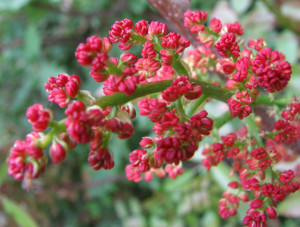Terebinthus (or Pistacia terebinthus), known commonly as terebinth and turpentine tree, is a species of Pistacia, native to the Canary Islands, and the Mediterranean region from the western regions of Morocco, and Portugal to Greece, western and southeast Turkey. In the eastern shores of the Mediterranean sea – Syria, Lebanon and Israel – a similar species, Pistacia palaestina, fills the same ecological niche as this species and is also known as terebinth.
Contents
Uses
It is used as a source for turpentine, possibly the earliest known source. The turpentine of the terebinth is now called Chian, Scio, or Cyprian turpentine.
Benefits
The fruits are used in Cyprus for baking of a specialty village bread. In Crete, where the plant is called tsikoudia, it is used to flavor the local variety of pomace brandy, also called tsikoudia. In the Northern Sporades the shoots are used as a vegetable (called tsitsíravla).The plant is rich in tannin and resinous substances and was used for its aromatic and medicinal properties in classical Greece. A mild sweet scented gum can be produced from the bark, and galls often found on the plant are used for tanning leather. Recently an anti-inflammatory triterpene has been extracted from these galls. In Turkey, where it is known as menengiç or bıttım, a coffee-like beverage known as menengiç kahvesi is made from the roasted fruit and a soap is made from the oil. Terebinth resin was used as a wine presevative in ancient Israel and the ancient Near East.
Cautions
Turpentine oil is POSSIBLY SAFE when adults use it on their skin or inhale it appropriately. When used on the skin, it can cause skin irritation. When inhaled, turpentine oil can cause spasms of the airways, particularly in people with asthma and whooping cough.
Turpentine oil is UNSAFE when taken by mouth or used over a large area of skin. Turpentine oil, when taken by mouth, can cause serious side effects including headache, sleeplessness, coughing, bleeding in the lungs, vomiting, kidney damage, brain damage, coma, and death.
Interactions
None are recorded.
Other names
Pistacia terebinthus/ terebinth / turpentine tree
References
Source: Wikipedia, https://en.wikipedia.org/wiki/Pistacia_terebinthus
WebMD, http://www.webmd.com/vitamins-supplements/ingredientmono-508-TURPENTINE%20OIL.aspx?activeIngredientId=508&activeIngredientName=TURPENTINE%20OIL

